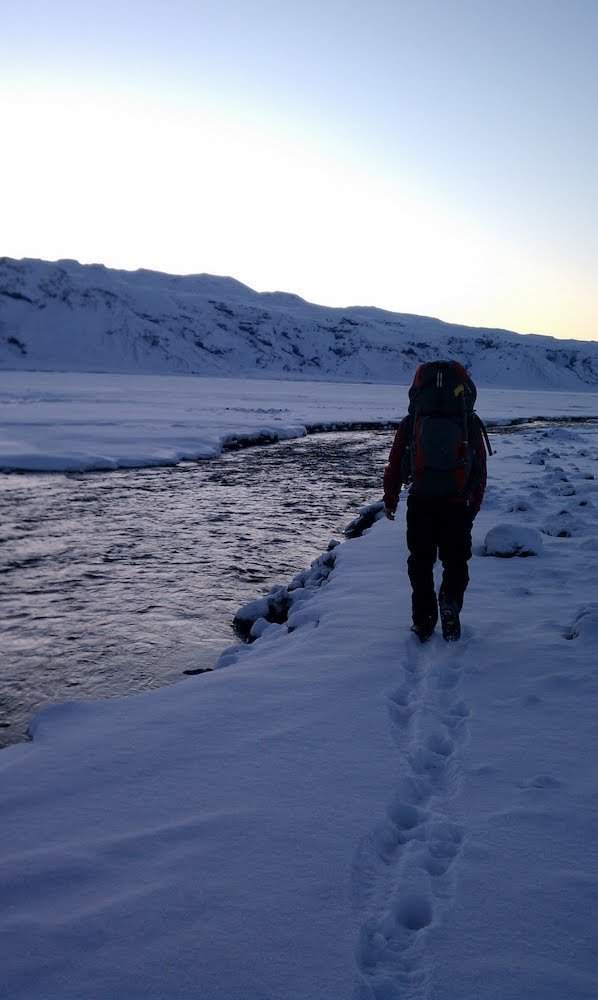On Glaciers and the Benefits of Failure
You help the others break the ice that seals the cabin doors shut with your ice ax. It’s the first time you’ve wielded an ice ax, and you automatically feel like a badass. At the same time, you feel cursed for having to do more work after trekking five miles through meter-deep snow, slowly reaching 800 meters from the floodplains at the foot of Eyafjallajökul below. You’re in the Icelandic wilderness in January, and shit just got real for you.
After trying to put the thought of Adam Sandler’s black foot, circa Mr. Deeds, out of your mind for some time now, you pull off your soaking boots and socks to confront the fragility of your body against such an unforgiving, beautiful place. Sure enough, the skin is bright red and shiny around the toes, and a member of the party, who just happens to be on the volunteer rescue team, nonchalantly confirms a mild case of frostbite.
“You’ll be fine,” he says, patting you on the shoulder, smiling. You play Icelandic Trivial Pursuit and trust his words.
Against your better judgment, you depart the next morning in search of Tindfjallajökul glacier. You question your intelligence while fiercely wiggling your toes in a futile effort to pump blood into them, waging a war on the encroaching crystallization of your bodily tissues. Two hours in, after scrambling up the side of a small face for which Mother Nature definitely intended the use of crampons (you didn’t use them), your toes are gone. Well, they might as well be, anyway.
You scoff at anyone who’s ever said that they can’t feel their [insert body part here] while carrying out a mundane task back home, such as waiting in line at the cinema or smoking a cigarette outside.
Although you can’t feel pain in your toes, the next part makes up for it. You admit to yourself, and then verbally to everyone else in the party, that you can’t go through with this. You feel like the classic bumbling and naive foreigner, and this is mostly because you are just that.
You and your host split off and climb a smaller mountain before pathetically dragging your frozen blocks of flesh back to the cabin. You refuse to go back without summiting, not wishing that the ultimate outcome of this outing be a seemingly arbitrary jaunt in a frozen wasteland in pursuit of an authentic case of frostbite.
After making it back off the mountain, you realize that you failed in a decidedly epic fashion. You underestimated the terrain and overestimated your equipment and limits. You best get your ass back to the mountains of twangy ole North Carolina where it belongs.
“After making it back off the mountain, you realize that you failed in a decidedly epic fashion.”
The benefits of failure
One activity practiced by some mainstream minimalist bloggers that I have always taken issue with is to never admit failure to their readers. Doing this hides some of the most beautiful moments in personal growth while making the blogger seem akin to an infallible cult leader. We all fail. I’m an actual human being who fails too. Quite a lot, it seems at times.
I will never be able to shake how stupid I was in Iceland, despite how much theoretical knowledge I had on the situation. Fortunately, for all the damage done, I learned a lot from my mistakes, as dire as they could have been. While pondering the tingling sensation in my toes caused by a smidgen of permanent nerve damage after my morning run, I decided that failures are as bad as we want to make them for ourselves and that we can even benefit from them if we like.
1. Failure is a teacher
We learn from our mistakes. Everyone knows that. But do we ever put the adage properly to practice? Learning from failure requires us to reflect on failure, and that can be incredibly painful. We often want to put our lowest moments out of our minds as quickly as possible. By doing this, we waste great opportunities to learn. It doesn’t make sense considering the pain it took to come across that opportunity. We should get in the habit of systematically analyzing our failures. Why did we fail? How can we prevent it from happening again? Performing a self-quality control check on our motives and actions sure beats moping around.
2. Failure humbles us
There’s nothing quite like a nice, healthy slice of humble pie. We may think we know everything, but failure is always there to remind us that we have a great deal more to learn. I was arrogant thinking as long as I had my North Face jacket and an assortment of other highly-regarded, brand-name winter gear, I was safe from the elements. I lost sight of Mother Nature’s rule until I failed, and was humbled by the hold that our environment still has on us, no matter how much expensive GORETEX we buy. It’s a good example of how failure helps us to realize the insignificance of our knowledge compared to unknown variables.
“We may think we know everything, but failure is always there to remind us that we have a great deal more to learn.”
3. Failure innovates
You could make the argument that innovation wouldn’t even exist without failure. If we succeeded easily at everything on the first attempt, we wouldn’t want to change anything we’re doing. As a result, there wouldn’t be very much creativity to speak of. Even if something is fundamentally successful, there are always some tiny failures that leave room for innovation.
Maybe your website design is beautiful and flawless, but you could improve on how you actually draw traffic to it. Solving the problems of our failures fuels our creativity and hardens our resolve so that we may be able to harness our failures as a tool rather than dwelling on them.
Failure can take a lot out of us and bring us dangerously close to giving up on the things we love. But these three benefits can help us develop a utilitarian attitude towards our shortcomings that is ultimately more useful to us than sitting around all jaded in a dark room listening to Radiohead. If we fail, we have the choice to be conscious of it, or we can act like it never happened until, well, the same circumstances come up again and we fail, again. I don’t need to tell you which is more harmful.
Hopefully, other bloggers will be more willing to share their failures with their audiences in 2012. Failure is a universally shared aspect of the journey of life, so why place yourself above it when you can benefit from the experience of people who have been there? The next time I fail, I’ll let you know. Wandering can have a low threshold for failure sometimes, and I am not ashamed to enlist some other wanderers to bail me out, and vice-versa. ◉
Written by Seth Barham










